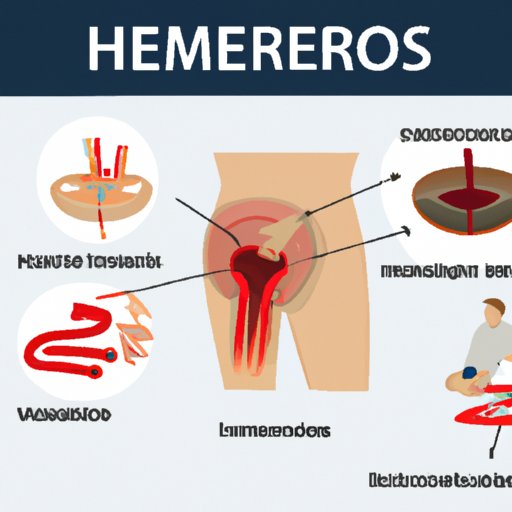
I. Introduction
If you have been experiencing rectal bleeding, itching, and discomfort, you might be wondering if you have hemorrhoids. Hemorrhoids are a common condition that affects up to 75% of people at some point in their lives. This condition can be painful and uncomfortable, but it can also be easily treated if diagnosed early. This article will explore how to know if you have hemorrhoids and what you can do about them.
II. What to Look Out for: Signs and Symptoms of Hemorrhoids
Hemorrhoids are swollen veins in your anus or lower rectum that can cause pain, itching, and bleeding. There are two types of hemorrhoids: internal and external. Internal hemorrhoids are located inside the rectum and usually don’t cause any pain. External hemorrhoids are located outside of the anus and can cause pain, itching, and swelling.
Symptoms of internal hemorrhoids can include:
- Bleeding during bowel movements
- Painless rectal bleeding
- Prolapse or protrusion of the hemorrhoid through the anus
Symptoms of external hemorrhoids can include:
- Swelling around the anus
- Itching or irritation in the anal region
- Pain or discomfort during bowel movements
If you have hemorrhoids, you may also experience pain, discomfort, and irritation in the affected area.
III. How to Self-Diagnose Hemorrhoids: A Quick and Easy Guide
If you suspect you have hemorrhoids, there are a few things you can do to check for them on your own. First, it’s important to understand the difference between internal and external hemorrhoids. Internal hemorrhoids are located inside the rectum and usually can’t be seen or felt. External hemorrhoids are located outside the anus and can be felt or seen.
To check for internal hemorrhoids, you can use a small mirror and a flashlight to look inside your rectum. Gently part the skin around your anus and look for any bulging or swelling. If you notice any abnormality, it’s important to seek medical attention.
To check for external hemorrhoids, you can feel around the anus for any lumps or swelling. External hemorrhoids are often accompanied by itching, burning, and discomfort.
IV. The Top 5 Signs You May Have Hemorrhoids
If you’re still unsure if you have hemorrhoids, there are a few signs that you should be aware of. The following are the top five signs that you may have hemorrhoids:
- Pain or discomfort during bowel movements
- Rectal bleeding
- Itching or irritation in the anal region
- Bump or swelling around the anus
- A feeling of fullness in the rectum
If you’re experiencing any of these symptoms, it’s important to schedule an appointment with your doctor. While hemorrhoids are a common condition, they can also be indicative of more serious medical conditions.
V. Don’t Ignore These Symptoms! How to Recognize Hemorrhoids
While hemorrhoids are a common condition, there are certain symptoms that require immediate attention. If you experience severe rectal bleeding, dizziness, or fainting, you should seek medical attention immediately. These symptoms may be indicative of a more serious medical condition such as colorectal cancer.
If your symptoms are less severe, there are a variety of treatment options available. Over-the-counter remedies such as creams, ointments, and suppositories can help ease pain and discomfort. Lifestyle changes such as increasing fiber intake and drinking more water can also help alleviate symptoms.
You should consult your doctor if you have persistent symptoms, or if your hemorrhoids are causing significant discomfort. Your doctor can recommend prescription medications, minor procedures, or surgery if necessary.
VI. Pain, Bleeding, and Discomfort: Understanding the Symptoms of Hemorrhoids
Understanding the primary symptoms of hemorrhoids is important for diagnosis and treatment. Hemorrhoids develop when the veins in the lower rectum and anus become swollen, which can be caused by a variety of factors, including pregnancy, obesity, and constipation.
The primary symptoms of hemorrhoids include:
- Bleeding during bowel movements
- Prolapse or protrusion of the hemorrhoid through the anus
- Pain or discomfort in the affected area
If you’re experiencing any of these symptoms, it’s important to seek medical attention. Your doctor can recommend treatment options to alleviate pain and discomfort, and can also provide recommendations for lifestyle changes to prevent recurrence of hemorrhoids.
VII. The Hemorrhoid Checklist: How to Determine If You Have Hemorrhoids
If you suspect you have hemorrhoids, there are a few things you can do to determine if your suspicions are accurate. First, check for any bulges or protrusions around your anus. If you notice any lumps or swelling, you may have external hemorrhoids.
Next, observe your bowel movements for signs of bleeding. If you notice blood on your toilet paper or in the toilet after a bowel movement, you may have hemorrhoids.
If you’re still unsure, it’s important to talk to your doctor. They can perform a physical examination and recommend treatment options.
VIII. From Itching to Swelling: What Are the Symptoms of Hemorrhoids?
Hemorrhoids can cause a variety of uncomfortable symptoms, including itching, swelling, and pain. Some of the most common symptoms of hemorrhoids include:
- Bleeding during bowel movements
- Pain or discomfort in the affected area
- Itching or irritation in the anal region
- Bumps or swelling around the anus
If you’re experiencing any of these symptoms, it’s important to seek medical attention. Your doctor can recommend treatment options to alleviate pain and discomfort, and can also provide recommendations for lifestyle changes to prevent recurrence of hemorrhoids.
IX. Conclusion
In conclusion, if you’re experiencing pain, discomfort, or bleeding during bowel movements, you may have hemorrhoids. It’s important to seek medical attention if your symptoms persist or worsen over time.
Making lifestyle changes such as eating a high-fiber diet and drinking plenty of water can help prevent hemorrhoids from developing. Over-the-counter remedies can also alleviate pain and discomfort, but it’s important to consult your doctor if your symptoms persist or worsen.
If you have any concerns about your symptoms or would like more information about treating hemorrhoids, talk to your doctor today.





